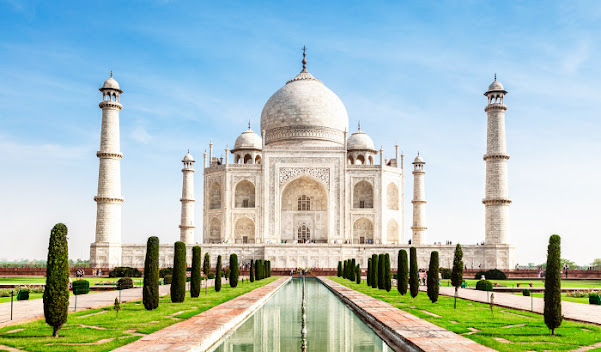9 Historical Places To Visit In India In 2022!
India
is a fantastic place to visit at any time of year, but March is one of the most
significant months to stay for a memorable trip. The weather in March is
pleasant since it is spring and the start of the summer months. Start by
looking at this custom-made list of direct flights from Jaipur to USA, all
of India's most important and well-known historical sites, which spans the
whole country:
Agra's Taj Mahal
Visit
the Red Fort near Delhi, India's most iconic landmark. Meet the king of ancient
sites in India. When it comes to India's top ten historical sites, the Taj
Mahal has always been on the top of the list. Experience the Taj Mahal, the
ultimate symbol of love, which magnificence has stood the test of time and is
now one of Delhi's weekends away. Shah Jahan ordered the construction of this
lavish white marble edifice for their late Mumtaz Mahal in 1632. This majestic
tower, regarded as one of India's most famous historical sites, took
approximately 22 years to finish.
According
to mythology, Shah Jahan chopped off the fingers of all the labourers who
constructed the Taj Mahal to prevent a comparable monument from being created.
Fact:
- Dubai
is building a four-times-larger retail mall and hotel inspired by the Taj
Mahal.
Uttar Pradesh's Agra Fort
Visit
the walled royal Agra Fort, one of India's most renowned historical sites made entirely
of red sandstone, to get a taste of the Mughal era's rich history. This
historical tourist attraction in India boasts two ornately carved gates: the
Amar Singh Gates and the Delhi Gate, which Akbar built-in 1565. Only Amar Singh
Gate provides a historic city replete with gates, courts, tunnels, palaces, and
mosques. It is one of Agra's most magnificent tourist attractions.
Fact:
Not
only was that fort included in the Sherlock Holmes investigation, but it was in
the film Jodha Akbar.
Delhi's
Red Fort is a must-see.
The
Red Fort, one of India's major tourist attractions, took ten years to
build. When Shah Jahan moved the capital between Agra to Delhi, he made the
Qila-e-Mubarak. This hexagonal fort is among the most well-known historical
sites in north India and where the President delivers his Independence Day
address. The Red Fort is stunning and one of India's most historically
significant locations.
Fascinating fact:
- Because
it was composed of limestone, the Red fort was white.
- Whenever
the stone began to crumble, the British coloured it crimson.
Delhi's Qutub Minar
The
Qutub Minar, considered the birthplace of the first Muslim empire in northern
India, is unquestionably one of India's most historically significant
structures. With its beautiful red sandstone stories, it is one of the most
spectacular instances of Indo-Muslim building. These are primarily in Arabic
& Nagari and with sculptures and Quran passages. Qutub Minar has been one
of India's most prominent historical sites, and it is supposed to after
Qutb-ud-din Aibak, the first Muslim monarch of North India. At the Qutub
Minar's foot sits the Quwwat-ul-Islam Masjid, India's first mosque.
Fact:
- A
2000-year-old iron pillar in the Qutub Minar compound has not rusted.
Delhi's Humayun's Tomb
Humayun's
Tomb is one of India's most renowned and significant landmarks, featuring a stunning
fusion of Indian & Persian architecture. In the 15th century, Hamida Banu
Begum, Humayun's wife, commissioned the construction of this Tomb for their
husband. This monument is a marvel of Indian architecture, with arched alcoves,
gorgeous domes, ornate passageways, and kiosks.
Fascinating fact:
- One of
the key influences for the Taj Mahal was Humayun's Tomb.
Uttar Pradesh's Fatehpuri Sikri
During
the reign of Akbar, the imperial city of Fatehpur Sikri served as the Mughal
capital. This royal city, once home to palaces, public buildings, temples, and
lodgings for the king, troops, and servants, is now one of India's historical tourism
destinations. Furthermore, a well-planned royal metropolis with carved
pillars and ornamented pillars was constructed between 1571 and 1573 AD and
abandoned due to water scarcity.
Fascinating fact:
- Many
infertile ladies visited the Sufi saint Salim Chisti's grave to pray for
kids.
Jaipur's Hawa Mahal
With
its 953 ornate windows, the 'Palace of Winds' or Hawa Mahal earns its name
because it resembles a beehive of a beehive. It's also fashioned like a crown
because Maharaja Sawai Pratap Singh, the king who erected it, was a
considerable admirer of Lord Krishna. One of Jaipur's most renowned tourist
attractions, this palace is famed for being the world's highest structure
without foundation. Because of its pyramidal structure, the court yet remains
sturdy.
Fact:
Allegedly
built its structure so the royal women could peek outside under 'purdah.'
Madhya Pradesh's Khajuraho Temples
Khajuraho
has long as the epitome of sensuality and sexuality in its purest form. It,
however, is a deception since only around 10% of the sculpture are sensuous,
with the remainder being conventional portrayals. In one of India's most
historically significant locations, several sculptures portray love,
everlasting elegance, beauty, delicacy, and the creative arts. Khajuraho
temples have statues of cult symbols, demigods, and Apsaras Direct flights to chennai from usa wonderful blend of Hinduism and
Jainism.
Fascinating fact:
- The
city for the date palms that decorated it, and "Khajura"
translates "date palms" in Hindi.
- In
olden history, it as Khajjurpura.
Madhya Pradesh's Sanchi Stupa
The
Sanchi Stupa, which holds relics of the Buddha, is one of Buddhism's most
sacred temples. Lord Asoka created this notable historical site in India for
Emperor Ashoka in the 3rd century B.C. The Stupa's Dome represents the wheel of
law, and it is said to be a symbol of Buddha's liberation and the round of
death and life (Moksha). The Stupa's four entrances depict scenes first from
Jataka stories and life stories of Buddha.
Fascinating fact:
The
Buddha's relics are a Mauryan polishing to shine like glass.



Comments
Post a Comment